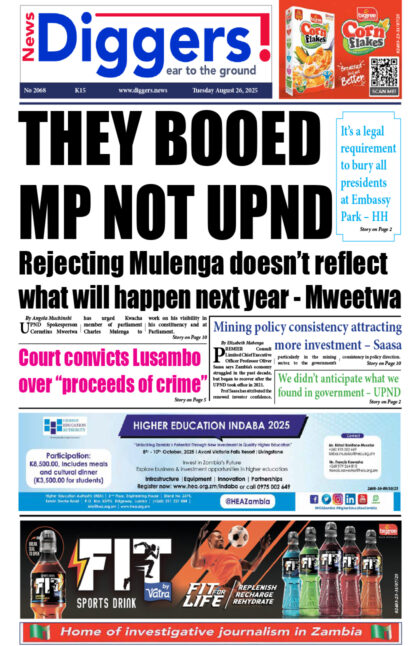NATIONAL Health Insurance Management Authority (NHIMA) Director General James Kapesa says the authority has invested K170 million in hospitals since its inception.
And Kapesa says no facility accredited to NHIMA must request for any cash payment in order for one to access medical services or drugs.
Speaking when he featured on Phoenix FM’s Let The People Talk programme, Tuesday, Kapesa said NHIMA was investing around K10 million per month in public and private hospitals.
“When we started in February we received 900 claims. Today we are processing upwards of 25, 000 claims and in the next month or so we will have 30, 000 claims. This means that this scheme called NHIMA has been warmly embraced and received by hospitals. In terms of actual cash payments, we are investing around K10 million per month in the public and private hospitals and a total of K170 million has been invested so far in the hospitals. This means that hospitals can now have money to buy medicines, employ security companies and cleaning companies. NHIMA now starts to be a catalyst for entrepreneurship growth in the health industry,” he said.
Kapesa said the Authority had conducted an annual review and certain conditions would be removed from the scheme to create space for those which were actively sought by the people.
“We can call those teething problems just like in a relationship. Some hospitals have just been onboarded in the NHIMA platform, they may have teething problems just like in any marriage or relationship. We have officers on standby who are ready to rush into the hospital and sit down with hospital staff and say ‘this is how NHIMA works according to our contract. NHIMA’s approach to health is inclusivity. This means no one should be left behind and so in the way we have designed our package, this is a list of diseases that are accessible through the NHIMA platforms’. Broadly all the common conditions that you will encounter in Zambia are covered,” he said.
“One or two things are not covered but we assure our people that apart from things like cosmetic surgery, cosmetic tooth extraction, beauty treatment, some fertility processes are not covered. We have also not covered some cancer conditions. The idea is that this benefit package is subject to annual review. As I speak to you, we are just from the first review meaning that some of the conditions which were not at all utilized will be removed to create space for those which were actively sought by our people. So there are very few conditions if any that will be excluded by NHIMA. There is no point at which you say your limit at NHIMA has expired. Your government’s intention is that every Zambian should have access to good quality healthcare.”
And Kapesa said no facility accredited to NHIMA must request for any cash payment in order for one to access medical services or drugs.
“All accredited hospitals and pharmacies for NHIMA have a poster announcing that they are accredited to NHIMA. If there is no poster then it is not a NHIMA facility. The public must know that the law does not compel every hospital to register with NHIMA so some hospitals as of necessity will not be in the scheme. Not every hospital or pharmacy is a NHIMA member because under the National Health Insurance Act, you are not compelled as a facility to register with NHIMA. Registration for a private or public facility depends on your business case,” he said.
“Additionally, no facility is expected to ask you to pay anything. If we get the details of a facility this is, we will send our managers immediately to go and verify. If they repeatedly do this, we will discredit them and we will prosecute them. Remember I have an agreement with this facility to say we will not charge anything on top of what we have agreed. So if there are facilities whether it is a public or private hospital or pharmacy which is asking you to top up, please send us the details. We will send our inspectors to first of all investigate and that could be the reason why we cancel the contract and take further legal action against such conduct. It is actually abrogating of the NHIMA contract.”
Kapesa said the Authority was ready to engage the informal sector in order for them to benefit from the scheme.
“We are ready to sit with those in the informal sector and agree on their average monthly income then we will deduct one percent of that income. Let us say your monthly income from selling cassava is K2, 000 then we put a one percent of that which may be K30. And using MTN, Airtel or Zamtel, you can now send a K2 every day from your mobile phone to the NHIMA account. So with that payment, you can go to either one of our 192 hospitals to receive cover. So this is for every Zambian including those in the formal and informal sector. There also maybe those who are vulnerable, the scheme makes sure that once we work with the Ministry of Community Development, we will also list you on the scheme and exempt you,” said Kapesa.























